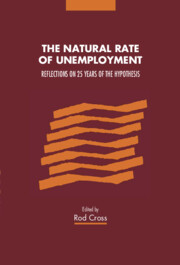Book contents
- Frontmatter
- Contents
- List of Contributors
- Preface
- 1 Introduction
- Part I The theoretical framework
- Part II Adjustment, ranges of equilibria and hysteresis
- 6 The economics of adjustment
- 7 Hysteresis and memory in the labour market
- 8 Models of the range of equilibria
- 9 Hysteresis revisited: a methodological approach
- 10 Is the natural rate hypothesis consistent with hysteresis?
- Part III Empirical tests and macro models
- Part IV Political economy
- Index
7 - Hysteresis and memory in the labour market
Published online by Cambridge University Press: 03 May 2011
- Frontmatter
- Contents
- List of Contributors
- Preface
- 1 Introduction
- Part I The theoretical framework
- Part II Adjustment, ranges of equilibria and hysteresis
- 6 The economics of adjustment
- 7 Hysteresis and memory in the labour market
- 8 Models of the range of equilibria
- 9 Hysteresis revisited: a methodological approach
- 10 Is the natural rate hypothesis consistent with hysteresis?
- Part III Empirical tests and macro models
- Part IV Political economy
- Index
Summary
Introduction
In a most lucid paper on hysteresis in economic systems, Cross (1993, references here are to the draft of June 1992; see also Cross, 1988) has reminded us of the difficulties of ‘forces acting at a distance’, whether spatial or temporal. If the distance is temporal, the difficulty may be resolved if the objects of study have memories. Whether physicists following Ewing have succeeded in endowing molecules with ‘memories’ I do not pretend to know. In dealing with the labour market, we are dealing with human agents who certainly have memories, and institutions created by these agents whose design may well be altered in response to shocks, or at least sufficiently severe shocks.
In this chapter I shall consider first, and briefly, the way memory may affect the supply side of the labour market, and then at greater length the demand side. The discussion here will necessarily be somewhat lengthy, since I wish to draw on earlier work (Archibald and Chinloy, 1987) which is not well known, and I wish to make this chapter reasonably autonomous. The advantage is that we shall find an economic interpretation of Cross ‘hysteresis operators’ which accounts for their heterogeneity across the market, the peculiar importance of certain (non-dominated) shocks, and the asymmetry of behaviour in upswing and downswing. My hope is that the Archibald–Chinloy model will provide some basis, albeit informally, in optimisation theory for hysteresis in economic behaviour. Some testable implications will emerge as the analysis proceeds.
- Type
- Chapter
- Information
- The Natural Rate of UnemploymentReflections on 25 Years of the Hypothesis, pp. 90 - 100Publisher: Cambridge University PressPrint publication year: 1995
- 2
- Cited by



